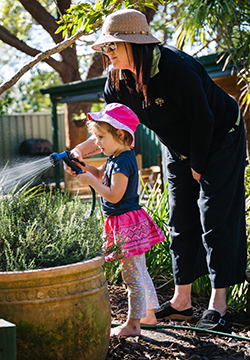- Home
- BELONGING, BEING & BECOMING - THE EARLY YEARS LEARNING FRAMEWORK
- (EYLF) PRINCIPLES
- (EYLF) Sustainability
Table of contents
- BELONGING, BEING & BECOMING - THE EARLY YEARS LEARNING FRAMEWORK
- (EYLF) INTRODUCTION
- (EYLF) A VISION FOR CHILDREN'S LEARNING
- (EYLF) ELEMENTS OF THE EARLY YEARS LEARNING FRAMEWORK
- (EYLF) EARLY CHILDHOOD PEDAGOGY
-
(EYLF) PRINCIPLES
- (EYLF) Secure, respectful and reciprocal relationships
- (EYLF) Partnerships
- (EYLF) Respect for diversity
- (EYLF) Aboriginal and Torres Strait Islander perspectives
- (EYLF) Equity, inclusion and high expectations
- (EYLF) Sustainability
- (EYLF) Critical reflection and ongoing professional learning
- (EYLF) Collaborative leadership and teamwork
- (EYLF) PRACTICES
- (EYLF) THE EARLY YEARS LEARNING FRAMEWORK PLANNING CYCLE
- (EYLF) LEARNING OUTCOMES
- (EYLF) GLOSSARY OF TERMS
- (EYLF) REFERENCES
(EYLF) Sustainability
Humanity and the planet we share with all living things face some big challenges. Educators and children have important and active roles to play in creating and promoting sustainable communities. Broadly defined, sustainability spans environmental, social, and economic dimensions which are intertwined. Environmental sustainability focuses on caring for our natural world and protecting, preserving and improving the environment. Social sustainability is about inclusion and living peacefully, fairly and respectfully together in resilient local and global communities. Economic sustainability refers to practices that support economic development without negatively impacting the other dimensions. This includes a focus on fair and equitable access to resources, conserving resources, and reducing consumption and waste.

Adopting this broader definition helps to meet the needs of the present without compromising the ability of future generations to meet their own needs. In sustainable communities, the requirements of humans, animals, plants, lands, and waters can be met now and for generations to come.
Educators recognise children’s avid interest in their world, their ability to engage with concepts of sustainability and their capacity to advocate and act for positive change. Children’s agency and their right to be active participants in all matters affecting their lives is supported. Further, children’s understanding of their citizenship, and rights and responsibilities as members of local and global communities, is built through meaningful and relevant educational experiences.
Thinking about sustainability means thinking about the future and acting to create healthy, just and vibrant futures for all. Educators encourage children to develop appreciation of the natural world, understand our impact on the natural world, and the interdependence between people, animals, plants, lands and waters. Sustainable practices are created with children and children are supported to take an active role in caring for the environment and to think about ways they can contribute to a sustainable future. Recognising that Aboriginal and Torres Strait Islander peoples have looked after Country for the past 60,000 years, educators and children learn about Aboriginal and Torres Strait Islander history, culture and rich sustainable practices.
Educators provide opportunities for children to learn about all the interconnected dimensions of sustainability, understanding that sustainability goes beyond learning in nature and being involved in nature conservation. Children are supported to appreciate that sustainability embraces social and economic sustainability – as well as environmental sustainability – and to engage with concepts of social justice, fairness, sharing, democracy and citizenship